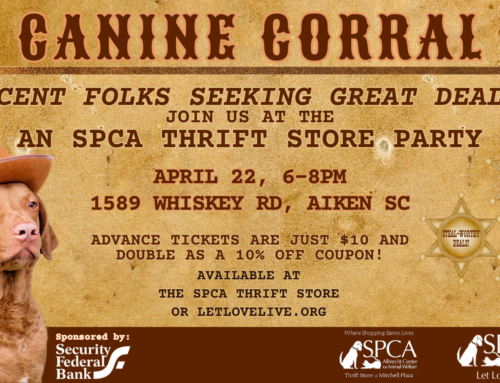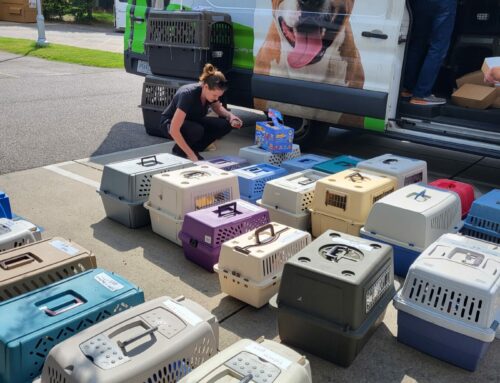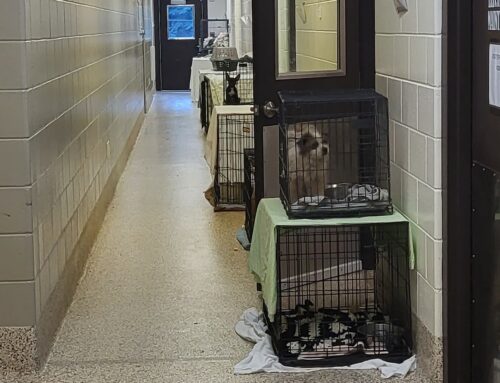By: Claire Roberson, Communications Director
Our dog Ozzy is what we like to call a “garbage hound.” Though not a hound, our 80-pound black lab can sniff out food from a mile away. Time after time, my husband and I would come home to trash strewn across our whole house from Ozzy’s quest for the last bite of food at the bottom of the trashcan.
We tried everything to keep him from eating trash– putting the can under the sink, buying a heavy, lidded can – until finally, we came to the understanding that we would have to live with a trashcan on top of our kitchen table (until we moved into our new house with a hidden trash drawer).
However, Ozzy’s determination is borderline admirable. He would find food in the house that we didn’t even know existed, and we had no idea how he found it. No, our dog is not starved. He is fed a veterinarian-recommended amount of food for his special diet. Ozzy just LOVES food – me too, Ozzy!
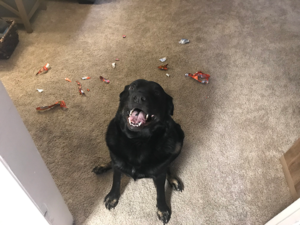
Panicked, we called Augusta Animal Emergency and the SPCA Albrecht Center’s Veterinary Care Center for advice. Both suggested closely monitoring Ozzy for the next few hours. At any sign of vomiting, difficulty going to the bathroom, pale gums, excessive drooling or refusal to eat, we were to take him to an emergency clinic (The SPCA’s Vet Care Center is NOT an emergency facility).
Luckily, apart from his bright green poop (courtesy of the pistachios), Ozzy passed everything he ate. This was due in part because he is a big boy and part because Reese’s Cups are more peanut butter than chocolate. However, he was lucky that day, and we took even more precautions from then on to ensure he could not sniff out more “goodies.”
Dogs are inherently scavengers and cats are notoriously curious, which makes our story not uncommon to many pet owners. You, yourself, may have experienced the same panic of knowing your companion ate something they shouldn’t have, but not knowing what it was or what to do to help them.
Sunday, March 15th through Saturday, March 21st is National Pet Poison Prevention Week – a week dedicated to educating pet owners what to do in this emergency situation and how to prevent it. And, the first step is to recognize what is toxic/poisonous to our pets, so we can avoid contact with these items in the first place.
The list for these items is long, but include everything from human medications and food to plants and chemicals. You can find both a dog and cat “Top Household Hazards” list online at pets.webmd.com: DOG TOXINS; CAT TOXINS
The big question is: What do I do if I believe my pet has been poisoned? First is to take note of the symptoms of pet poisoning and observe your pet experiencing these symptoms. Of course, if you saw first-hand your pet ingesting a poisonous substance, take them immediately to your local emergency clinic. The quicker your pet is monitored and treated, the better the outcome.
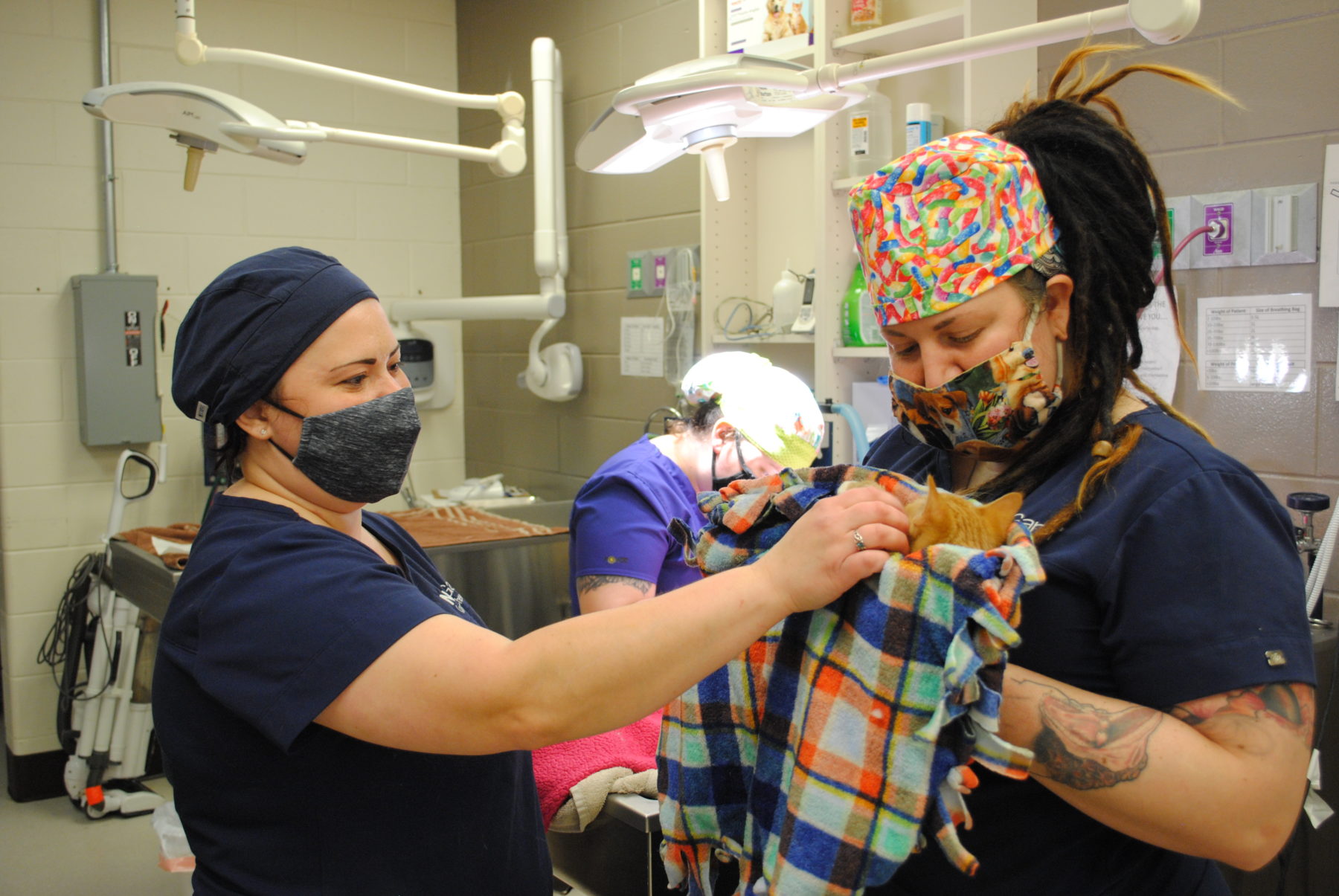
Described in more detail on 1800petmeds.com, symptoms of pet poisoning include: vomiting, diarrhea, seizures, bloody stool, loss of appetite, nosebleeds, bruising, irregular heartbeat, lethargy, and the inability to urinate. The symptoms vary based on what your pet has been exposed to. For example, gastrointestinal symptoms, like loss of appetite and vomiting, are most common when an animal has ingested a toxic plant, garbage or lead paint.
If you believe your pet has ingested a poisonous substance, it’s time to take action immediately. Put your pet in a room away from any toxic materials. Take note of what your pet has eaten, take photos of the labels or bring any remnants to the vet with you. Call your vet ASAP or, if after-hours, take your pet to a 24-hour emergency vet clinic. If you live in Aiken, the closest emergency clinic is Augusta Animal Emergency – (706) 733-7458; 208 Hudson Trace, Augusta, GA 30907.
The vet may induce vomiting to determine the substance eaten (NEVER attempt to induce vomiting yourself unless instructed by a licensed veterinarian), or they may pump your pet’s stomach. In the case your pet ate a foreign object, such as toy stuffing, socks, or fabric, surgery may be required to remove the item.

There is an incredible online resource for pet poison control, complete with a 24-hour hotline (with a $59 consultation fee). Pet Poison Helpline connects you with a veterinary professional to evaluate the poisoning and determine whether you can monitor your pet from home or need to take your pet to a vet. If it is determined that you must take your pet to a veterinarian, Pet Poison Helpline works with your vet to create a personalized treatment plan. Hotline: (855) 764-7661.
SOURCES
https://www.1800petmeds.com/education/symptoms-poisoned-dog-cat-10.htm
An Aiken native and self-proclaimed cat lady, Claire Roberson is the SPCA Albrecht Center’s Communications Director, working in marketing, grant writing and media correspondence. She attended College of Charleston, where she graduated with a degree in Nonprofit Business and interned with Charleston Animal Society, the leader in No-Kill South Carolina. When not working, you can find Claire hanging out with her 18-pound Maine Coon mix, Anakin.
The SPCA Albrecht Center for Animal Welfare is a private, nonprofit, no kill animal shelter in Aiken, SC. The SPCA also operates a local Thrift Store (“Where Shopping Saves Lives”), a public, affordable Veterinary Care Center & a Dog Park. It is our mission to improve the lives of companion animals by rehoming abused, abandoned, and neglected pets while fighting for their well-being through vigorous legislative efforts, humane education, and by offering affordable veterinary care for all.
WANT TO SUPPORT OUR HOMELESS ANIMALS?

